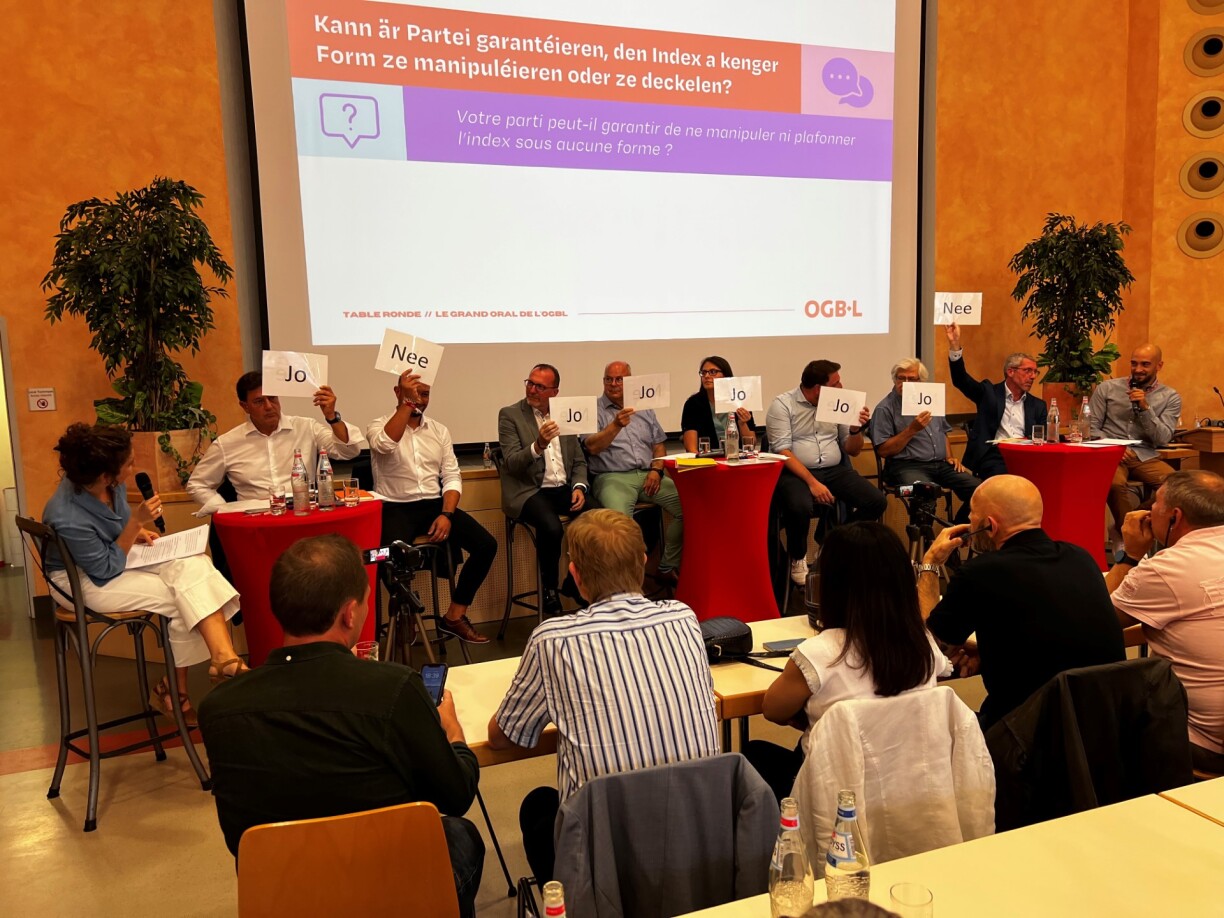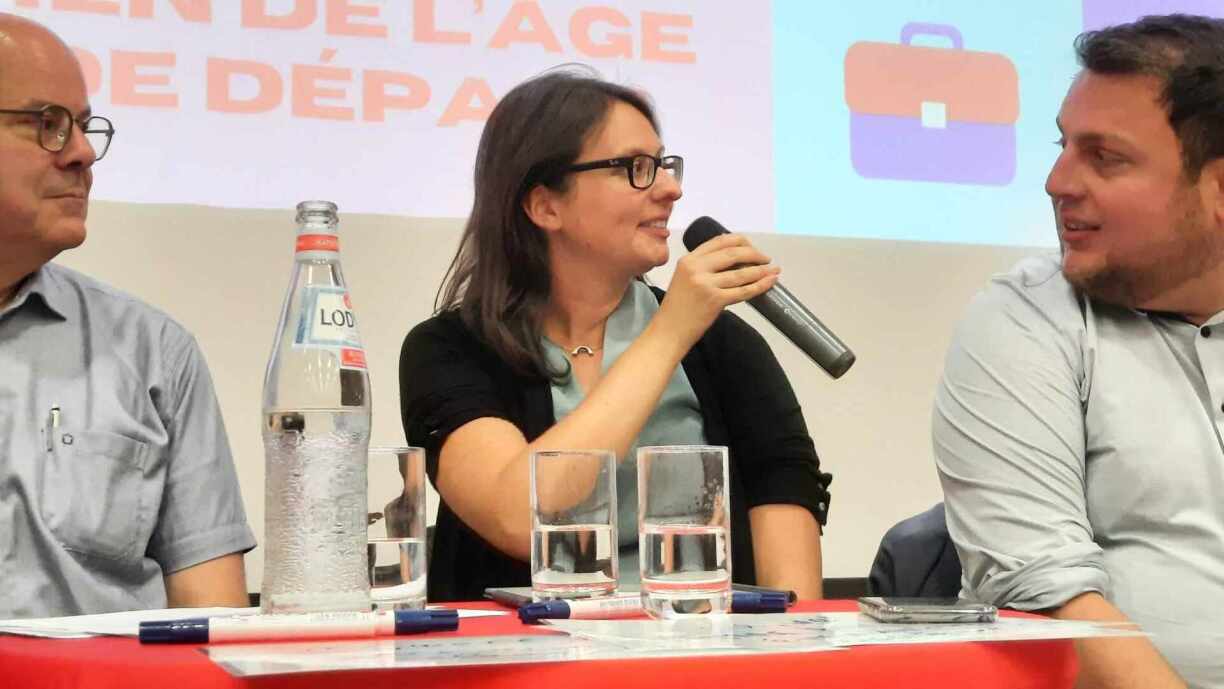
As the legislative elections draw nearer and the campaign fervour intensifies, candidates representing the Democratic Party (DP), the Luxembourg Socialist Workers’ Party (LSAP), the Christian Social People’s Party (CSV), the Green Party (déi Gréng), the Pirate Party, the Left Party (déi Lénk), the Luxembourg Communist Party (KPL), and Fokus engaged in spirited discussions. Despite occasional moments of tension in the packed Maison du peuple in Esch, the OGBL-hosted round table maintained a semblance of order, even when viewpoints diverged sharply.
The OGBL presented five critical questions to the candidates, centring on key issues within its trade union agenda. These questions revolved around concerns related to the manipulation of the wage indexation scheme, reindexation of the tax scale, reduction of working hours, pensions, and the use of MRI scanners, a controversial healthcare issue at the moment.
Throughout the discussions, a recurring theme emerged — the need to address growing economic disparities in a prosperous nation through a more equitable tax structure.
The first question, regarding the assurance that the wage indexation system would remain untouched or capped for the next five years, ignited a heated exchange of views. Fokus and the Pirate Party, both proponents of imposing a cap on the index, firmly responded with a resounding “no.” Frank Engel, spokesperson for Fokus, underscored the concept of “more for those at the lower end of the income spectrum and less for those at the higher end,” advocating for a wage indexation scheme skewed in favour of smaller incomes. Bruno Da Silva, coordinator of the Pirate Party in the Southern region, advocated for “capping the index at €11,000 to secure a €250 increment, which would be a reasonable proposition.”
Georges Engel, LSAP candidate representing the Southern region and the outgoing Minister of Labour, offered a contrasting viewpoint with a calm warning, “if we start dividing society into haves and have-nots, solidarity will crumble.” Carole Thomas, co-spokesperson for the Left Party, issued a sharp rebuke to Fokus, saying, “it’s the wrong way,” before targeting those in power: “The only ones who have manipulated the index are the government parties,” singling out LSAP, DP, and the Green Party. Her statement garnered enthusiastic applause from the audience.
Ali Ruckert, the snappy chairman of the Communist Party, further escalated the applause by declaring, “the index’s purpose is to uphold purchasing power. It must be fully maintained!” Pim Knaff, the DP candidate from the Southern region, recognising that he found himself in a traditionally left-leaning constituency, responded by explaining the challenges of navigating a “turbulent period” marked by the transition from Covid-19 and Ukraine’s forced entry into the war. He defended the government’s policy choices, asserting, “all index brackets have been paid.”

The stances adopted by political parties regarding the prospect of a comprehensive reduction in working hours, without financial repercussions for employees, highlighted differing approaches to addressing this issue.
Thomas (Left Party) articulated her viewpoint, arguing that “productivity has reached exceptional heights in recent years. Now is the time!” Her party’s proposal entails reducing the standard working week in Luxembourg to 32 hours, with a cap of 40 hours, to be phased in incrementally by 2030. The Left Party advocates the implementation of a framework law to achieve this objective.
Knaff (DP) and Marc Spautz (CSV) share a similar perspective, contending that “working hours should be subject to negotiations between employers and employees,” as explained by Knaff. They believe that a constructive dialogue is the path to achieving a more favourable work-life balance. However, the DP candidate noted, “sending a message to work less is not ideal, especially after two years of a pandemic, and considering the existing staffing shortages.” The Green Party, represented by Meris Šehović, the lead candidate in the South, maintains that the issue should be addressed on a sector-by-sector basis.
Ruckert (Communists) redirected the discussion toward the reality of working conditions in Luxembourg, highlighting that “half of all workers lack collective labour agreements!” The Communists assert that reducing working hours is imperative, advocating for mandatory collective agreements in companies with over 100 employees. The KPL believes that the government should leverage both legislation and collective agreements to enforce this change.
Engel (LSAP), taking pride in initiating the resurgence of the working time debate, received applause from the audience when he emphatically stated, “we’re in favour of it!” He underscored that such a move is vital for Luxembourg to maintain its appeal in the Greater Region and to address the pressing labour shortage issue.